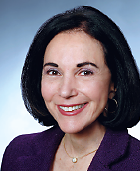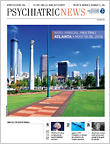The theme of the 169th APA Annual Meeting is “Claiming Our Future: Psychiatry’s Roles in the New Era.” I chose this theme because it represents my excitement about the future direction of our profession. As reflected in our new logo, we deal with what I consider to be the most interesting part of medicine—the interaction of the mind, brain, and body. Our future also involves understanding population health and participating in new models of health care delivery, as well as being advocates for topics that are in our realm of expertise. The Annual Meeting is an opportunity to bring ourselves up to date with advances in psychiatry so we can fulfill all of our roles.
One of my first actions after I was elected president-elect was to appoint Dr. Steve Koh as chair of the Scientific Program Committee. Dr. Koh is a well-respected and highly accomplished early career psychiatrist who already has had multiple leadership positions within APA. I asked him to continue the tradition of having the meeting be scientifically rigorous, but also to make the meeting even more relevant to our younger members, who are the future of psychiatry. Dr. Koh and the Scientific Program Committee have put together an amazing constellation of presentations. I want to thank him for his help with the writing of this column.
The 2016 Annual Meeting will take place in the great city of Atlanta from May 14 to 18. Considered a world center, Atlanta is the ninth largest city in the United States and boasts recent downtown revitalization. It serves as one of the epicenters of the new American South. With its rich history, robust city center, diverse economy, emerging technological companies, and extensive media presence, Atlanta is a perfect setting to showcase the history of our profession and our future. This issue of Psychiatric News includes detailed information about some of the city’s key attractions, the Martin Luther King Jr. National Historic Site and the World of Coca-Cola to name just two. I would encourage you to take advantage of what the city has to offer during your visit.
In keeping with my theme, Dr. Koh and the Scientific Program Committee worked to plan an exciting meeting that would bring together our membership and also be a vehicle for change in the host city. We wanted the meeting to be timely, use state-of-the-art learning formats, and cover wide-ranging interests within our profession. The meeting will feature more than 400 scientific sessions, 41 courses, and hundreds of exhibits and offer up to 40 CMEs.
I am particularly pleased to tell you about the outstanding guest speakers we have lined up for you. The Opening Session on Sunday, May 15, will be followed by a lecture by best-selling author and physician
Dr. Atul Gawande, whose vision for improving performance and safety in health care continues to influence the field of medicine today. This year’s William C. Menninger Memorial Convocation Lecture will be presented by
Dr. Thomas Frieden, director of the Centers for Disease Control and Prevention, on Monday, May 16. On Tuesday, May 17, we are honored to be joined by Supreme Court Justice
Stephen Breyer for a special session. He will talk about how the work of the U.S. Supreme Court is linked to more global issues.
Distinguished psychiatrist lectures cover wide-ranging topics, such as Dr. Jeff Metzner’s talk on correctional psychiatry, Dr. Matt State’s lecture on genetics, Dr. Francis Lu’s lecture on cultural psychiatry, Dr. Mardi Horowitz’s overview of PTSD, and Dr. Larry Faulkner’s views on medical education quality and its measurement.
Presidential symposia include topics on innovation, such as telepsychiatry (Dr. Jay Shore) and mental health and primary care integration (Dr. Lori Raney), and on timely topics such as community and judicial responses to those with mental illness (Miami-Dade County [Fla.] Judge Steve Leifman) and ethics (Dr. Rebecca Brendel). Presidential forums include fascinating overviews that cover mental health care financing (Dr. Steven Sharfstein), LGBT mental health (Dr. Ellen Haller), and the refugee experience (Dr. Julio Licinio). Dr. Jim Dilley, the recipient of the prestigious Adolph Meyer Award, will talk about HIV prevention and treatment, and Prof. Michael Trimble, a distinguished psychiatrist from Great Britain, will give an illuminating talk on why humans cry.
We are continuing our interactive sessions in which attendees will have a chance to interact with luminaries in our profession covering areas such as advocacy (Dr. Patrice Harris), integrated care (Dr. Jürgen Unützer), forensic psychiatry (Dr. Phil Resnick), physician leadership (Dr. Paul Summergrad), and women’s mental health (Dr. Gail Robinson).
Our NIH partner organization
this year is the National Institute on Drug Abuse. Under the direction of its director, Dr. Nora Volkow, we will host special seminars run by NIDA. As always, we are joined by our colleagues from subspecialty organizations such as the American Association of Directors of Psychiatric Residency Training, American Association of Child and Adolescent Psychiatry, American Academy of Psychiatry and the Law, and American Association for Geriatric Psychiatry.
We have also worked to consolidate and streamline our younger members’ experience at the Annual Meeting and to integrate their needs and interests. We are redesigning the sessions for our chief residents and incorporating new ways to link our medical students with our APA resident/fellow leaders. To engage in new ways of learning, we are introducing “Innovative” formats in which we will explore topics in a debate format (controversial treatments: ketamine and marijuana),
interactive lab, and
real-time simulation.
In claiming our future, we wanted the meeting to act as a venue for world experts to interact with local experts. The Annual Meeting should not just be a temporary event in Atlanta, but an event in which we can create something lasting and impactful for our local mental health professionals. To do this, we have engaged with local academic and community leadership to create unique experiences to showcase Atlanta’s innovative mental health programs and have worked with our local partners such as the Carter Center and the psychiatry departments at Emory and Morehouse.
This issue of
Psychiatric News contains the meeting’s preliminary program and information on special sessions and our host city. For updated information, please check the
Annual Meeting section at and follow
@APAPsychiatric on Twitter. I hope you will join the conversation and engage in live tweeting during the meeting using #APAAM16. The free Annual Meeting app is available now with more features than ever, so please
download and share with other attendees.
The APA Annual Meeting is the premier psychiatric event not only in the United States but the world. It is a chance for us to come together, see friends and colleagues, and learn of scientific progress. We are delighted to offer you an excellent program and look forward to seeing you in Atlanta in May! ■

